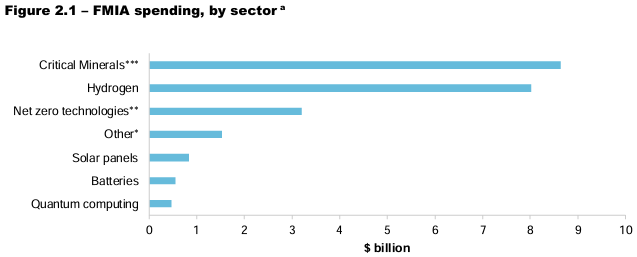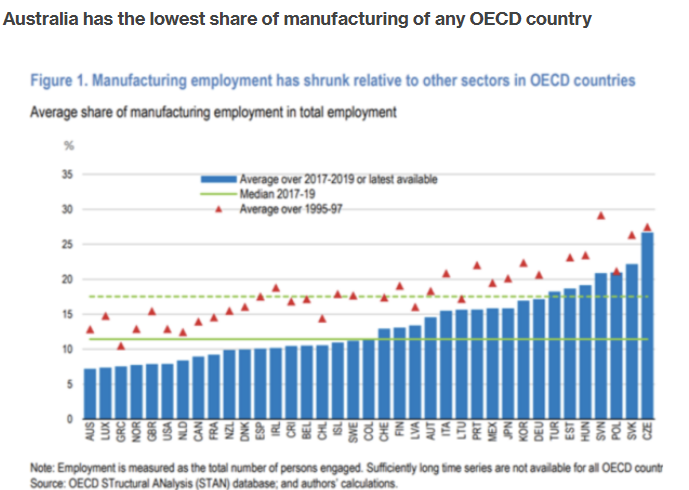The Productivity Commission (PC) has released its latest Trade & Assistance Review, which warns that the Albanese government’s $22.7 billion “Future Made in Australia” (FMIA) subsidies for low-emissions manufacturing are a new form of protectionism that risks degrading Australia’s future productivity growth and living standards.
The PC explains the FMIA policy as follows:
“Much of this support will be provided to industry in the form of tax concessions (e.g. production tax credits to renewable hydrogen and critical minerals processing projects), budget expenditure (e.g. appropriations to green metals and low carbon liquid fuels), and concessional finance”.

“The Australian Government has stated that one of the rationales for the FMIA program is to back industries where it believes Australia is likely to have a long run comparative advantage”…
“Treasury argues that there are grounds for believing that Australia can have an enduring comparative advantage in hydrogen, green metals, and low carbon liquid fuels”.
In the media release accompanying this year’s Trade & Assistance Review, PC deputy chairman Alex Robson gave the following warning, aimed squarely at FMIA subsidies:
“It is important that industry policy is well-articulated and subject to rigorous and public cost benefit analysis. Policy discipline will ensure industry assistance is focused on achieving clear goals at least cost to the Australian community, without inadvertently becoming a new form of trade protectionism”.
“Governments should be cautious in pursuing industry policy on this basis and build in off-ramps to allow a timely exit if these policies fail to achieve their stated aims”.
The remarks follow those of PC chairwomen Danielle Wood, who previously warned that FMIA risked creating a host of inefficient and uncompetitive firms forever reliant on subsidies.
Alex Robson reiterated these concerns last week, noting:
“While the current suite of industry policies has been aimed at a range of policy goals … if poorly designed, they could act as a form of trade protectionism”.
“After all, a $100 subsidy for domestic producers can have the same protectionist effect as a $100 tariff imposed on their foreign competitors”.
If the Albanese government actually wants to stimulate manufacturing in Australia, it should reform the East Coast gas market and make energy cheap for Australian businesses and individuals.
East Coast Australia is a major gas exporter and sends more than 70% of its gas offshore, mostly to China.
However, because there is no domestic gas reservation regime on the East Coast, Australians pay some of the world’s most expensive gas prices.
These high gas prices also raise electricity prices, increasing costs for businesses and households.
If the Albanese government followed Western Australia and every other gas exporter on earth and set aside a reasonable portion of our export gas for domestic consumption, and regulated its cost using traditional cost-plus pricing, then Australia would have low gas and energy prices, as well as a competitive manufacturing industry.
Manufacturing would then thrive on its own, eliminating the need for government subsidies.
Western Australia has some of the world’s lowest gas and energy prices, despite being a major gas exporter.
The United States is now the world’s largest gas exporter, but domestic prices stay low (circa $US2.50 a gigajoule) thanks to its gas reservation policy. It also decreased emissions by switching from coal to gas.
If you fix the gas market, you fix everything in terms of energy costs, and your domestic manufacturing economy will be significantly more competitive.

Furthermore, where will the plastics for Labor’s FMIA solar panels come from now that Qenos – Australia’s last remaining plastics manufacturer – has collapsed owing to high gas prices?
Obviously, these plastics would be imported from China. So, why not just import the entire panel for a lower cost than Australia could ever build?

